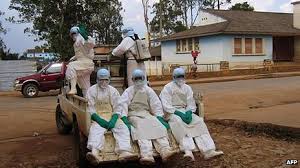
By Felix Sesay, Virginia, USA.
When the Chief Medical Officer of Sierra Leone Dr. Brima Kargbo, made the clarion call to action against the dreaded Ebola virus on April 9, 2014, he specifically advised the public against the consumption of bush meat (standard precaution , because one may never know which bush meat is infected with the Ebola virus) and coming into contact with infected remains of Ebola victims (the internal hemorrhage caused by the virus can sometimes manifest in external bleeding and thereby provide a vehicle of transmission to unsuspecting family members paying final respect to loved ones).
FELIX SESAY
From what I have read so far in newspapers, the mode of transmission of Ebola to our people is from bodily contact with infected relatives. The deaths of the Koindu driver and Amie Ngumba Klah, after caring for their Ebola infected relatives are sobering reminders of the contagious and lethal nature of Ebola. May their souls rest in perfect peace.
The Ministry of Health and Sanitation headed by Madam Miata Kargbo has been actively sensitizing the public about the mode of transmission of this killer virus and advising our people to remain vigilant. To date, according to newspaper reports, 17 Sierra Leoneans have died from the disease and the situation is taking a dimension of worrying proportions. How should we avoid Ebola from becoming a pandemic in our country?
![]() Government should reiterate its call to citizens to promptly report all symptoms of Ebola virus to health officials.
Government should reiterate its call to citizens to promptly report all symptoms of Ebola virus to health officials.
![]() Suspected individuals with Ebola virus should be isolated, tested and released to the public if they tested negative.
Suspected individuals with Ebola virus should be isolated, tested and released to the public if they tested negative.
![]() Individuals infected with Ebola should be isolated from the public and symptoms managed by health care providers donning personal protective gear to meet the requirement of Standard, Contact and Droplet Precautions.
Individuals infected with Ebola should be isolated from the public and symptoms managed by health care providers donning personal protective gear to meet the requirement of Standard, Contact and Droplet Precautions.
![]() Family members visiting loved ones in isolated health environments should be provided with personal protective equipment and decontamination protocol followed after their visit.
Family members visiting loved ones in isolated health environments should be provided with personal protective equipment and decontamination protocol followed after their visit.
![]() Government should provide personal protective equipment to our outpatients in all hospitals or clinics. Unprotected health care workers have already died from Ebola exposure.
Government should provide personal protective equipment to our outpatients in all hospitals or clinics. Unprotected health care workers have already died from Ebola exposure.
![]() Special mortuaries should be provided for suspected and confirmed Ebola victims’ remain.
Special mortuaries should be provided for suspected and confirmed Ebola victims’ remain.
![]() Considering the fact that the risk for person-to-person transmission of Ebola is greatest during the later stages of Ebola, when the viral load is highest, officials of the Ministry of Health and Sanitation, equipped with personal protective equipment, should take over the burial of Ebola victims, to avoid the recycling of the virus into our community.
Considering the fact that the risk for person-to-person transmission of Ebola is greatest during the later stages of Ebola, when the viral load is highest, officials of the Ministry of Health and Sanitation, equipped with personal protective equipment, should take over the burial of Ebola victims, to avoid the recycling of the virus into our community.
![]() During the cholera campaign, MOH sought the services of local music artists and theater groups to educate the people with positive results.
During the cholera campaign, MOH sought the services of local music artists and theater groups to educate the people with positive results.
![]() This strategy should be revisited with a renewed sense of urgency to get the Ebola message to our highly illiterate population.
This strategy should be revisited with a renewed sense of urgency to get the Ebola message to our highly illiterate population.
Ebola virus, which has a 90 percent mortality rate, is a serious public health threat and we should all work together to contain it. With globalization in its advanced stage in this 21st century, no district, country or person is immune to a killer virus, whose main vectors, are unfortunately, human beings.





Leave a Reply